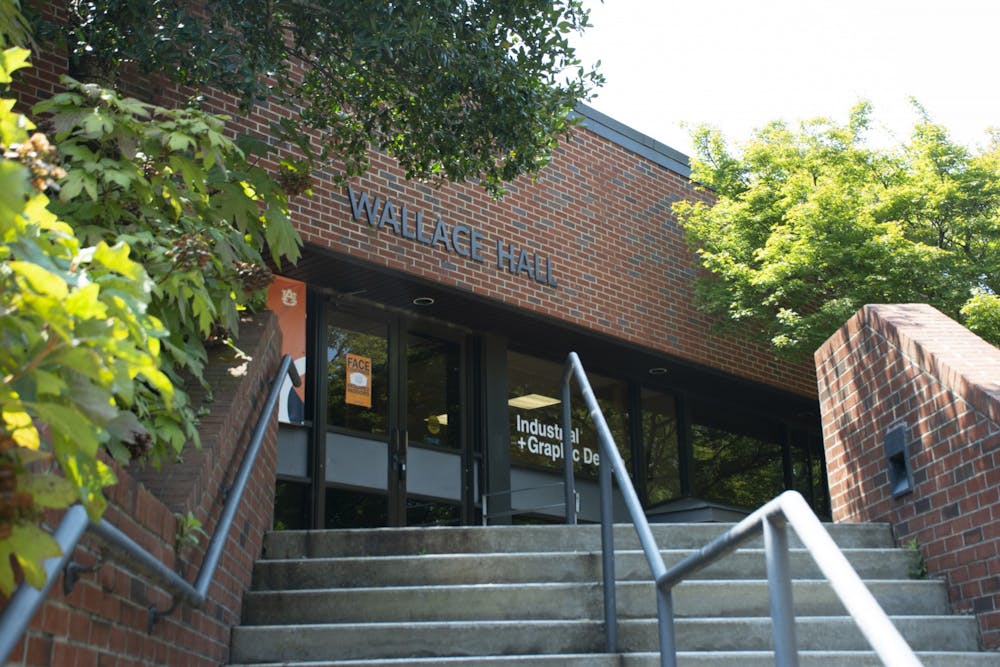The Auburn University Board of Trustees unanimously approved the installation of a plaque outside Wallace Hall during its Friday morning meeting. The plaque is designed to contextualize the name of the building, named after former Alabama governor and self-described segregationist George Corley Wallace.
The text of the plaque, included in the board’s materials, describes the “complexity of Wallace’s legacy,” including Wallace’s racist history and later apologies for his segregationist words and deeds.
There is currently no timeline set for the installation of the plaque.
Wallace is known for delivering the phrase "segregation now, segregation tomorrow and segregation forever.” Wallace Hall was built in 1984 and has been the subject of controversy on Auburn’s campus for years. As of publication, 11,984 people have signed a petition on Change.org to change the name of the building.
The proposal to place the plaque at Wallace Hall, located at 210 S. Donahue Dr., was the recommendation of the Trustee Task Force, formed in summer 2020. The Trustee Task Force was also responsible for recommending the renaming of the Harold D. Melton Student Center.
Trustees James Pratt, Elizabeth Huntley, Sarah B. Newton and Quentin Riggins make up the four-person group. Pratt and Huntley spoke to the board during the committee meetings held before the regular meeting.
“I want everyone to understand that we, the task force, took the requests to evaluate certain namings very seriously because it’s a very serious issue with students, faculty and for all of the Auburn Family,” Pratt said. “And in doing so, I would ask you to consider that context and perspective matter.”
The task force met with community stakeholders for input on the topic of building names but did not discuss the specific case of Wallace Hall with stakeholders, Huntley said.
“This was back in the summer when we first started, one of the first things we wanted to do was canvass stakeholders and get feedback and get input and hear from our stakeholders,” Huntley said. “We’ve met with several stakeholders … the newly formed African American Advisory Committee, African American student leaders, with members of the NAACP state chapter, so, yes, we have heard from various groups.”
Huntley said that the task force took into account the historical context in which the building was erected in 1984, when Wallace was in his fourth and final term as governor. At this time, Wallace had made efforts to change his public image and had offered apologies for some of his earlier actions and statements.
Huntley pointed out that some civil rights leaders, including former U.S. Rep. John Lewis, had forgave Wallace while not forgetting his previous actions. She said what was Wallace's self-proclaimed new outlook is an important aspect of evaluating the building’s name.
“As a result, our task force came to the conclusion that the full historical context of Wallace’s political career must be acknowledged through the contextualization of the Wallace building,” Huntley said. “We simply must tell all of the history. We understand the political backdrop of the trustees at the time of the naming, but it is important to do so.”
The full text of the plaque reads as follows:
Wallace Hall is named after George Corley Wallace, four-time governor of the State of Alabama and was erected on Auburn’s campus in 1984. The life of Governor Wallace was one of great complexity from his early actions as a self-described segregationist to his later life when he apologized for his words and deeds promoting segregation. In his last election as governor of Alabama, in 1982, he won with more than 90 percent of the black vote. The complexity of Wallace’s legacy has been an ongoing conversation for decades. Auburn’s obligation as an institution of higher education is to promote challenging conversations, which is a valuable component of the academic process.
Do you like this story? The Plainsman doesn't accept money from tuition or student fees, and we don't charge a subscription fee. But you can donate to support The Plainsman.

Evan Mealins, senior in philosophy and economics, is the editor-in-chief of The Auburn Plainsman.





